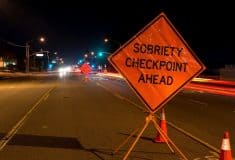Getting a DUI is a Financial Wrecking Ball
If you need any more reasons not to drink and drive, consider this: A typical DUI costs about $10,000 even if you didn’t hit anything or hurt anybody. A Texas Department of Transportation survey revealed that the total cost of a drunk driving arrest and conviction, ranges from $9,000 to $24,000.
An estimated 11,000 people die in drunk driving crashes in the U.S. every year and more than 1 million people are arrested for driving under influence. Some drunk driving-related fees include bail fees, attorney fees, court costs, driving under the influence education programs, and car towing or impounding. Take a look at what a DUI does to your bank account:
Bail: If you don’t want to sit in jail, you’ll have to make bail to get released. Cost: $150-$2,500.
Towing: When you’re arrested, your car gets towed. Some places only charge $100 or so. However, in some states fees go as high as $1,200 for the first 24 hours and $50 for each additional day of storage. Many states order offenders to have a car ignition interlock device installed inside their cars which checks the driver’s blood alcohol content level. This device can cost as much as $200 to install and $80 per month to maintain. Cost: $100-$1,200.
Drunk driving education: A mandatory drunk driving education program can cost between $1,500 and $2,500.
Reinstatement fee: There is a $250 reinstatement fee that must be paid before a driver receives his or her full driving privileges.
Legal fees: Attorneys are expensive, and with so much at stake, many people accused of DUI fight the charge. That’s when things really start to get pricey.
Insurance: One of the biggest hits a drunken driver takes is in his insurance premiums. It is estimated that in the five years following a drunk driving conviction, an offender’s car insurance bill can increase by $5,000 to $10,000. If you are convicted of drunk driving, your auto insurance company can double, triple; even quadruple your auto insurance rate.
Whether or not your auto insurance coverage rates will increase depends on the rules in your state, your prior relationship with your car insurance company, the type of conviction you received, and the level of your conviction.
If your drunk driving conviction was a felony, your rates are likely to go higher than a misdemeanor conviction because it shows a more serious problem with your driving abilities.
An SR-22 insurance document is required by most states for high-risk drivers. The document guarantees that the driver can pay future claims up to the state required limit. The driver’s insurance company files the SR-22 with the appropriate state department (for example, the Department of Public Safety, or the Department of Motor Vehicles). Even if you do not own a vehicle, you may be required to purchase SR-22 insurance. And an insurance card or policy does not a substitute the SR-22 form.


